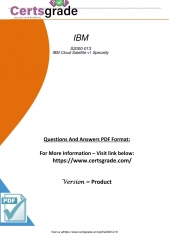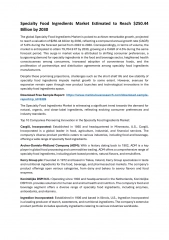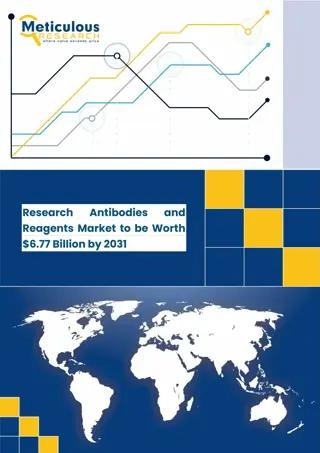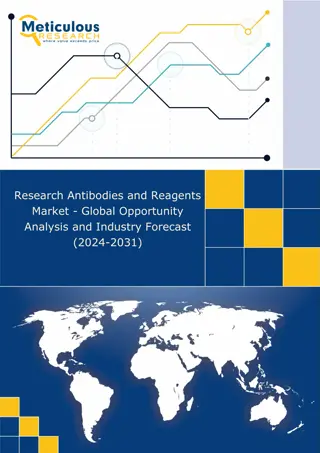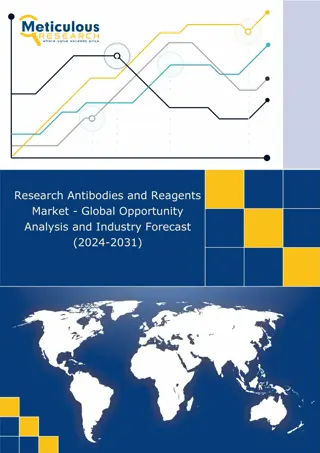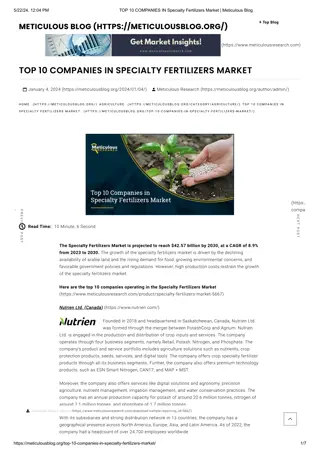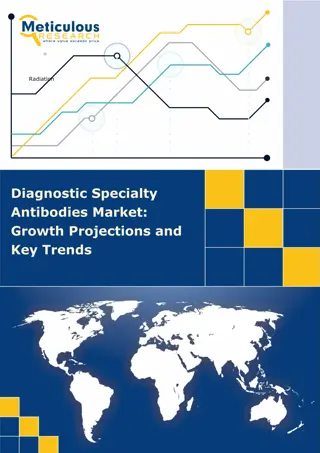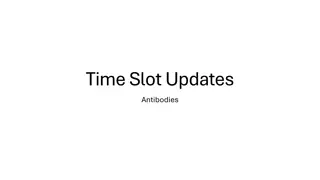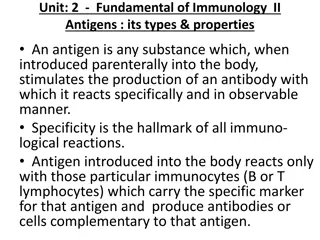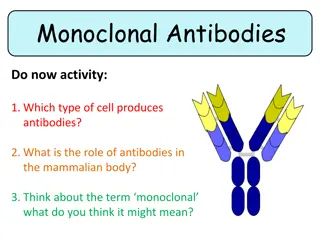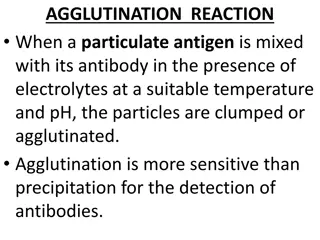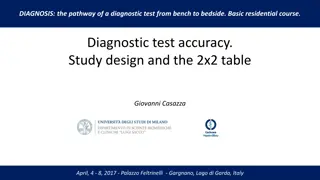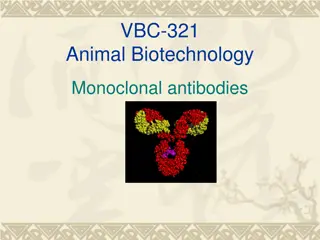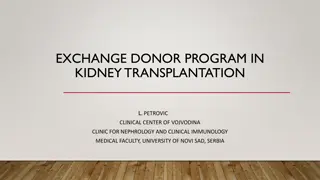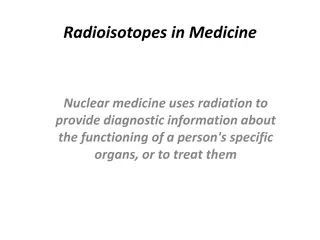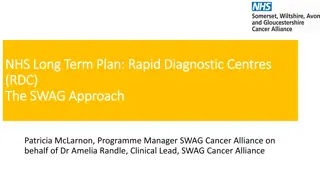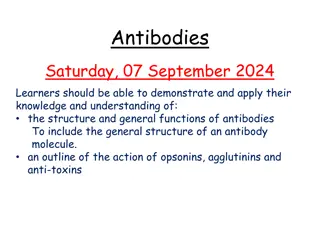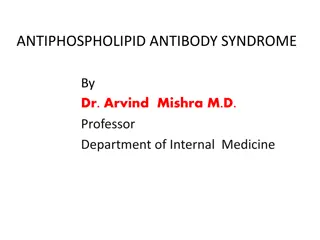
Diagnostic Specialty Antibodies Market: Opportunities in Developing Regions
Diagnostic Specialty Antibodies Market by Type (Primary, Secondary), Clonality (Monoclonal, Polyclonal), Technique (WB, Rapid Test, IHC, IP), Conjugate, and Application (Dengue, Malaria, Hepatitis, HIV, E. coli , Tuberculosis, Pneumonia, Cancer)- For
Download Presentation

Please find below an Image/Link to download the presentation.
The content on the website is provided AS IS for your information and personal use only. It may not be sold, licensed, or shared on other websites without obtaining consent from the author. If you encounter any issues during the download, it is possible that the publisher has removed the file from their server.
You are allowed to download the files provided on this website for personal or commercial use, subject to the condition that they are used lawfully. All files are the property of their respective owners.
The content on the website is provided AS IS for your information and personal use only. It may not be sold, licensed, or shared on other websites without obtaining consent from the author.
E N D
Presentation Transcript
o Radiation Diagnostic Specialty Antibodies Market: Insights into Market Dynamics and Demand
Global XXX Market 2022-2029 Meticulous Research has released a new report forecasting substantial growth in the global diagnostic specialty antibodies market. Titled Diagnostic Specialty Antibodies Market by Type, Clonality, Technique, Conjugate, and Application Forecast to 2029, the report predicts that the market will reach $39.99 billion by 2029, growing at a compound annual growth rate (CAGR) of 4.6%. This growth is driven by the high global burden of infectious and chronic diseases, increased funding for research activities, and a rising demand for pregnancy test kits due to the growing number of pregnancies. Additionally, regulatory approvals for new test kits and initiatives by public and private organizations to boost diagnostic testing are expected to create significant opportunities, particularly in emerging markets. Request Sample PDF @ https://www.meticulousresearch.com/download-sample- report/cp_id=5241 Recombinant Antibodies Set for Fastest Growth Among these segments, recombinant antibodies are expected to witness the fastest compound annual growth rate (CAGR) during the forecast period. This growth is driven by their advantages over other types of clonal antibodies. Recombinant antibodies can be produced more quickly and are more cost- effective, offering better binding affinity to target antigens. They also eliminate issues associated with traditional hybridoma technology, further boosting their demand in the market. ELISA Leads Among Diagnostic Techniques When it comes to diagnostic techniques, the market includes methods such as Western Blot, enzyme- linked immunosorbent assay (ELISA), lateral flow assay, immunohistochemistry (IHC), immunoprecipitation, and immunocytochemistry. In 2022, the ELISA technique accounted for the largest market share. ELISA is popular due to its simplicity, high efficiency, specificity, and sensitivity. Moreover, it is more cost-effective compared to other techniques like Western Blot and IHC, making it a preferred choice for many diagnostic applications. Unconjugated Antibodies Dominate the Market Based on conjugates, antibodies are categorized into conjugated and unconjugated types. In 2022, unconjugated antibodies held the largest share of the market. These antibodies are favored due to the flexibility and specificity they offer in various assays. The introduction of new unconjugated antibodies for disease diagnosis has further fueled the growth of this segment. High Demand for Infectious Disease Diagnostics The market is also segmented by application into categories such as infectious diseases, oncology, blood group typing, pregnancy detection/fertility testing, and others. The infectious diseases segment held the largest market share in 2022. This can be attributed to the high prevalence of diseases like dengue, HIV, influenza, tuberculosis, and sepsis. Initiatives by public and private organizations to promote early disease testing and the growing popularity of self-testing kits for infectious diseases are further driving this segment's growth. Page 1 of 2 Meticulous Research| sales@meticulousresearch.com
Global XXX Market 2022-2029 Market Segmentation and Key Drivers The diagnostic specialty antibodies market is categorized based on type, clonality, technique, conjugate, application, and geography. 1.Type: The market is segmented into primary and secondary antibodies. In 2022, primary antibodies accounted for the larger market share. This is largely due to their ability to bind directly to target antigens, which is crucial for various diagnostic tests. The necessity of primary antibodies in most assays and the growing number of regulatory approvals for primary antibody-based test kits further support this segment s growth. 2.Clonality: The market includes monoclonal, polyclonal, and recombinant antibodies. Each type has its specific applications and benefits, contributing to the overall expansion of the market. 3.Technique: Diagnostic specialty antibodies are used in various techniques, including Western Blot (WB), lateral flow assay, enzyme-linked immunosorbent assay (ELISA), immunohistochemistry (IHC), immunoprecipitation (IP), immunocytochemistry (ICC), and other advanced diagnostic techniques. The use of these techniques varies depending on the specific application and the required sensitivity and specificity of the test. 4.Conjugate: Antibodies are categorized as either conjugated or unconjugated, depending on their use in diagnostic assays. 5.Application: The antibodies are used in a wide range of applications, including the diagnosis of infectious diseases like dengue, malaria, hepatitis, HIV, and respiratory infections such as COVID-19, tuberculosis, and pneumonia. They are also crucial in oncology, gastrointestinal infections, pregnancy detection, and fertility testing. Contact Us: Meticulous Research Email- sales@meticulousresearch.com Contact Sales- +1-646-781-8004 Connect with us on LinkedIn- https://www.linkedin.com/company/meticulous-research Page 2 of 2 Meticulous Research| sales@meticulousresearch.com

